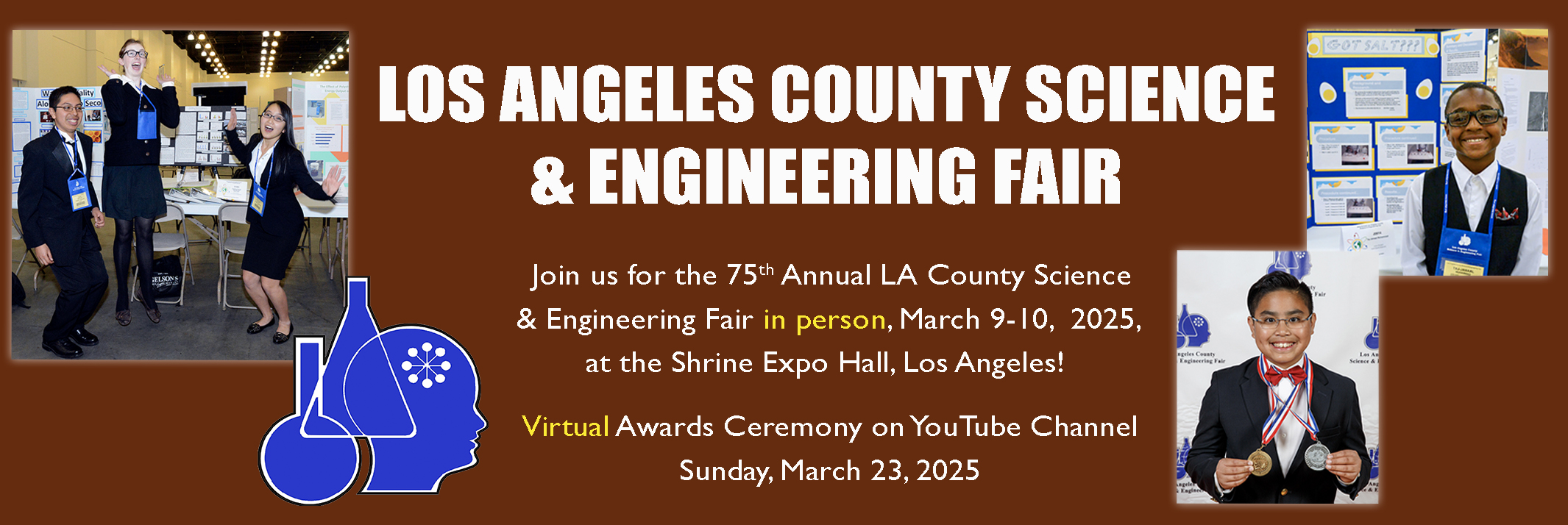Projects may require different levels of supervision, based on their topic. All student research projects involving Human Participants, Vertebrates and Higher Functioning Invertebrates, Potentially Hazardous Biological Agents (includes microbes, tissue/cell lines, organs, organ parts, blood products, rDNA, phages), Hazardous Chemicals, Activities or Devices (HCAD) need supervision and must comply with guidelines from the International Science and Engineering Fair (ISEF) as modified by the Los Angeles County Science & Engineering Fair.
Descriptions and qualifications:
Teacher/Advisor (Adult Sponsor) is the person in whose school or lab the student is working. This individual must have a solid background in science and should have close contact with the student during the course of the project. The Teacher/Advisor must be familiar with the regulations that govern potentially dangerous research as it applies to a specific student project. Some experiments involve procedures or materials that are regulated by State and Federal laws. If not thoroughly familiar with these regulations, the Teacher/Advisor should help the student enlist the aid of a qualified Biomedical Scientist.
The Teacher/Advisor is ultimately responsible, not only for the health and safety of the student conducting the research, but also, for the tissue, human subjects and/or animals used in the experiment. The Teacher/Advisor must review the student’s Research Plan to make certain of the following:
(a) Experimentation is done within local, state and federal laws and the Los Angeles County Science & Engineering Fair Project Screening Guidelines.
(b) Required online pre-approval is completed by the student involved in the project and other supervising adults and approved by the SRC prior to the start of research; and
© The qualifications of any Biomedical Scientist adhere to listed criteria below.
The Teacher/Advisor is responsible for ensuring that the student’s research is eligible for entry in the Los Angeles County Science and Engineering Fair.
Biomedical Scientist: A qualified Biomedical Scientist should possess an earned doctoral/professional degree in the biological or medical sciences as it relates to the student’s area of research. However, a master’s degree with equivalent experience and/or expertise in the student’s area of research is acceptable when approved by the Teacher/Advisor. The Biomedical Scientist must be thoroughly familiar with local, state and federal regulations that govern the student’s area of research.
The Biomedical Scientist and the Teacher/Advisor may be the same person, if that person is qualified as outlined above. A student may work with a Biomedical Scientist in another city or state. In this case, the student must also work locally with a Designated Adult Supervisor who has been trained in the techniques the student will use.
Designated Adult Supervisor is an adult who is directly responsible for overseeing student experimentation. The Designated Adult Supervisor need not have an advanced degree, but should be thoroughly familiar with the student’s project and must be trained in the student’s necessary research techniques. The Teacher/Advisor or the parent may act as the Designated Adult Supervisor.
If a student is experimenting with live vertebrates and the animals are in a situation where humans influence their behavior or habitat, the Designated Adult Supervisor must be knowledgeable about the humane care and handling of the animals. If the Designated Adult Supervisor is not knowledgeable, the Teacher/Advisor must ensure that the student enlists the help of an Animal Care Supervisor.
Animal Care Supervisor is the person required for all non-human vertebrate animal projects. This person must be familiar with the proper care and handling of research animals used in the project. The Biomedical Scientist, Designated Adult Supervisor or animal care professional can usually serve as the Animal Care Supervisor. The Animal Care Supervisor may also be the Site Science Fair Coordinator.
